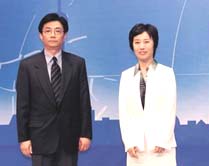 In a move to be more transparent, the Shanghai government debuted its two spokespersons at a press conference yesterday. The pair, Jiao Yang and Jiang Lan, were introduced to the media by the secretary general of the city government, Du Jiaohao.
In a move to be more transparent, the Shanghai government debuted its two spokespersons at a press conference yesterday. The pair, Jiao Yang and Jiang Lan, were introduced to the media by the secretary general of the city government, Du Jiaohao.
Jiao spoke about the government's regulations for self-improvement, its efforts to win the "Healthy City" title from the World Health Organization and its intention to curb downtown traffic congestion.
"The new regulations are aimed at creating a clean and responsible government that exercises administration according to the law. It always puts people's interest in the utmost place," she said.
Under the regulations, the municipal government is required to have one or two plenary meetings every year. In principle, the mayor and vice mayors should not send letters of congratulation or give inscription to businesses. Any form of government-hosted ceremonies or award ceremonies will be under strict control.
Jiao also said the government has accepted a proposal to build Shanghai into a "Healthy City" in three years.
The concept, a notion advocated by the WHO, has seen over 1,200 cities participate in the program since it was established in 1986. To be a "Healthy City," a clean, safe physical environment, where the basic needs are met for all people, must be established. The city should have a diverse and innovative economy and a sustainable eco-system.
"The spread of SARS pushed ahead the program," Jiao said. "Jiading District is the first in the city to cooperate with the WHO in implementing the standards."
To speed up local traffic, Shanghai will introduce five measures, including controlling traffic of mini-vehicles, cracking down on traffic violations and clearing up minor accidents more quickly, increasing public transportation capacities, reducing the number of construction projects that block roads and improving the public awareness of traffic management.
"With the measures, the government aims to achieve significant progress by the end of this year," Jiao said. "The mid- and long-term targets are also in discussion to fundamentally relieve the traffic jam by 2010."
Vehicles equipped with 1.2-liter or smaller engines may not be allowed to drive on some inner-ring elevated roads and outer-ring highways during rush hours.
Currently, the restriction is used for vehicles equipped with 1.0- liter or smaller engines.
"If other measures have produced a good result in fighting traffic jams, we may not take the stricter restriction on the traffic of mini-vehicles this year," said Zhou Yunjin, a city traffic and patrol police team officer.
The city also promised to increase transportation capacities of the metro, bus and taxi networks.
For the metro, commuters can expect to enjoy more frequent service by the year's end. The city will also add 77 bus lines and set up 150 taxi stops.
The government plans to host the briefings every two weeks on the fifth floor of Shanghai Urban Planning Exhibition Hall.
(eastday.com June 4, 2003)
|

